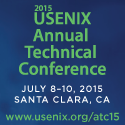
Get more
Help Promote graphics!
Sponsored by USENIX, the Advanced Computing Systems Association
The 2016 USENIX Advances in Security Education Workshop (ASE ’16) will be co-located with the 25th USENIX Security Symposium (USENIX Security '16) and take place on August 9, 2016 in Austin, TX.
Important Dates
- Paper submissions due: Tuesday, May 3, 2016, 11:59 pm PDT
Tuesday, May 10, 2016 11:59 pm PDT Deadline extended! - Notification to authors: Tuesday, June 7, 2016
- Final paper files due: Wednesday, July 6, 2016
- Short talk abstracts due: Tuesday, June 28, 2016, 11:59 pm PDT
- Short talk acceptance notifications: Tuesday, July 5, 2016
Workshop Organizers
Program Co-Chairs
Program Committee
Steering Committee
Overview
The 2016 USENIX Advances in Security Education Workshop (ASE ’16) is a new workshop, co-located with the 25th USENIX Security Symposium, designed to be a top-tier venue for cutting-edge research, best practices, and experimental curricula in computer security education.
The workshop welcomes a broad range of paper submissions on the subject of computer security education in any setting (K-12, undergraduate, graduate, non-traditional students, professional development, and the general public) with a diversity of goals, including developing or maturing specific knowledge, skills and abilities (KSAs), or improving awareness of issues in the cyber domain (e.g., cyber literacy, online citizenship). ASE is intended to be a venue for educators, designers, and evaluators to collaborate, share knowledge, improve existing practices, critically review state-of-the-art, and validate or refute widely held beliefs.
ASE is the evolution of the USENIX Summit on Gaming, Games, and Gamification (3GSE), expanded to welcome a wider range of contributions to security education research. This broadened workshop scope is intended to attract those already working in this space within the traditional USENIX Security community, as well as those from outside the technical communities, including education researchers, social scientists, and practitioners. The workshop will attempt to represent, through invited talks, paper presentations, panels, and tutorials, a variety of approaches and issues related to security education.
Format
ASE is intended to be a venue for informal collaboration and community-building. The program will consist of:
- A keynote address
- Paper sessions for both accepted and invited papers discussing new approaches, technologies, evaluation strategies, and reporting on actual experiences, allowing time for follow-up discussion
- A panel discussion and sessions exploring some of the more popular and controversial issues in security education
All sessions are intended to stimulate group discussion and impact future work. We also encourage attendees to participate in the "lightning talks" session, where they can bring attention to new results, present a short video demo of technologies, distribute materials, or make announcements of interest to the education community (new events, projects, funding opportunities, venues, etc.).
Topics
The core mission of ASE is to disseminate and catalyze cutting-edge computer security education research. Specific topics of interest include, but are not limited to:
- Novel pedagogical approaches and experimental curricula
- Diversity and outreach efforts
- Education technology research in a security education context
- Tools and techniques for measurement, evaluation, and assessment
- Frameworks and infrastructures supporting education
- Experiences with standards, certifications, and accreditation
- Security games and competitions
- Extramural and extracurricular education programs
- Experience with alternative teaching modalities for computer security, including: MOOCs, inverted classrooms, and distance learning
- Security education geared toward non-technical audiences
Papers that primarily focus on experimental infrastructures and testbeds, where education is a possible application, may be a better fit for the existing CSET workshop, also co-located with the USENIX Security Symposium. Authors are strongly encouraged to consider the intended audience for their research and submit to the appropriate workshop. Please contact the organizers of either workshop if in doubt.
Short Talks
ASE will continue 3GSE’s short talk submission option. These talks highlight fresh ideas, unique perspectives, valuable experiences, and emerging trends in computer security education. Short talks are five-minute presentations on work and ideas not ready or suitable for peer-reviewed publication, but worth sharing to jump-start discussion among and solicit feedback from attendees.
Short talk presentations are five minutes in duration with an additional five minutes for discussion. If you would like to present a short talk at the event, please email a talk abstract to ase16talks@usenix.org. There are no length or content requirements for the short talk abstract, but a few sentences describing what you'd like to do or announce, informally, is appropriate. Short talk abstracts are due June 28, 2016 and acceptance notifications will be sent July 5, 2016.
Paper Submissions 
Submissions must be 6–8 pages long including tables, figures, and references. Text should be formatted in two columns on 8.5" x 11" paper using 10-point type on 12-point leading ("single-spaced"), with the text block being no more than 6.5" x 9" deep. Text outside the 6.5" x 9" block will be ignored.
Submission need not be anonymized. Submissions must be in PDF and must be submitted via the Web submission form.
All accepted papers will be available online to registered attendees before the workshop. If your paper should not be published prior to the event, please notify production@usenix.org. The papers will be available online to everyone beginning on the day of the workshop. At least one author from every accepted paper must attend the workshop and present.
Simultaneous submission of the same work to multiple venues, submission of previously published work, or plagiarism constitutes dishonesty or fraud. USENIX, like other scientific and technical conferences and journals, prohibits these practices and may take action against authors who have committed them. See the USENIX Conference Submissions Policy for details. Questions? Contact your program co-chairs, ase16chairs@usenix.org, or the USENIX office, submissionspolicy@usenix.org.
Papers accompanied by nondisclosure agreement forms will not be considered. Accepted submissions will be treated as confidential prior to publication on the USENIX ASE ’16 Web site; rejected submissions will be permanently treated as confidential.
connect with us